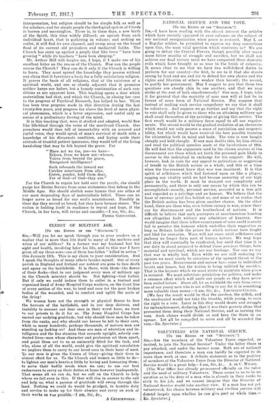NATIONAL SERVICE AND THE VOTE. [To TEE EDITOR Or THE
" SPECTATOR.") have been reading with the closest interest the articles which have recently appeared in your columns on the subject of our national reorganization when peace is restored. May I, as a Regular soldier, be permitted to express my deep convictions upon this, the most vital question which confronts us? We are going to defeat the Central Powers, though possibly after many more bitter months of struggle and sacrifice, but we shall not achieve our final victory until we have conquered those domestic evils which have brought us so near to the brink of calamity. It seems clear to me that we have two well-defined duties to perform for our country—the first, to see to it that she stands strong by land and sea and air to defend her own shores and the rights and liberties of others weaker than herself; the second, to purify her government. May I suggest to you that these two questions are closely akin to one another, and that we may strike at the root of both simultaneously? One may, I hope, take it for granted that the majority of sane men will at last be in favour of some form of National Service. But suppose that instead of making such service compulsory we say that it shall be voluntary. And suppose we go further and say that the right to vote shall only be given to those who on attaining military age shall avail themselves of the privilege of giving this service. The first result would be a military force equal to all our require- ments. The second would be the gradual evolution of an electorate which would not only possess a sense of patriotism and responsi- bility, but which would have received the best possible training for citizenship both in mind and body. The vote is now bought cheaply and held cheaply. If any man doubts this, let him obtain and read the political speeches made at the by-elections of 1914. He will find that the arguments used by the chosen orators of the Government are those which set forth the personal gain likely to accrue to the individual in exchange for his support. He will, however, look in vain for any appeal to patriotism or suggestion of benefit to the British nation as a whole, and this at a time when the Government knew that war was imminent. It is this spirit of selfishness which had fastened upon us like a plague, sapping our vitality until wo had become unworthy of our high place in the world. It must be stamped out completely and permanently, and there is only one means by which this can be accomplished—namely, personal service, accorded as a free gift and regarded as a privilege and an honour. We believe that the hour of extreme peril lies behind us, and some of us realize that the British nation has been given another chance. On the other hand, there are those who, even before victory is won, renew their cry for disarmament and the brotherhood of nations. It is difficult to believe that such purveyors of sanctimonious humbug are altogether fools without any admixture of knavery. Ono would imagine that these fellow-countrymen of ours could scarcely fail to perceive the humour which underlies their suggestion so long as Britain holds the prizes for which nations have fought and bled for centuries. Wars will not cease until selfishness and
jealousy no longer form part of human nature. We may hope that they will eventually be eradicated, but until that time it is our duty to stand prepared to defend those precious things, both material and spiritual, which are our heritage. Nor can we say that war is wholly bad. Even while we are still enduring its agonies we must surely be conscious of the upward thrust of the
past two years. Bereavement and sorrow have come to individual hearts and hones, but the nation is being uplifted by sacrifice. That is the keynote which we must strive to maintain when peace is restored. We must substitute patriotism for politics, and make a common effort which will unite our people as they have never been united before. Above all, let us withhold the vote from every one of our young men who is not willing to pay for it in something more valuable than money .—I am, Sir, &c., LIEUTENANT-COLONEL.
[We fear the result would be that the careless, the selfish, and
the uneducated would not take the trouble, while young, to earn the right to a vote. Later in life they would desire and struggle for enfranchisement, declaring that it was their poverty alone that prevented them doing their National Service, and so earning the vote. Such claims would divide us and keep the State in an uproar. Let all be compelled to serve and all be accorded the vote.—En. Spectator.]


































 Previous page
Previous page